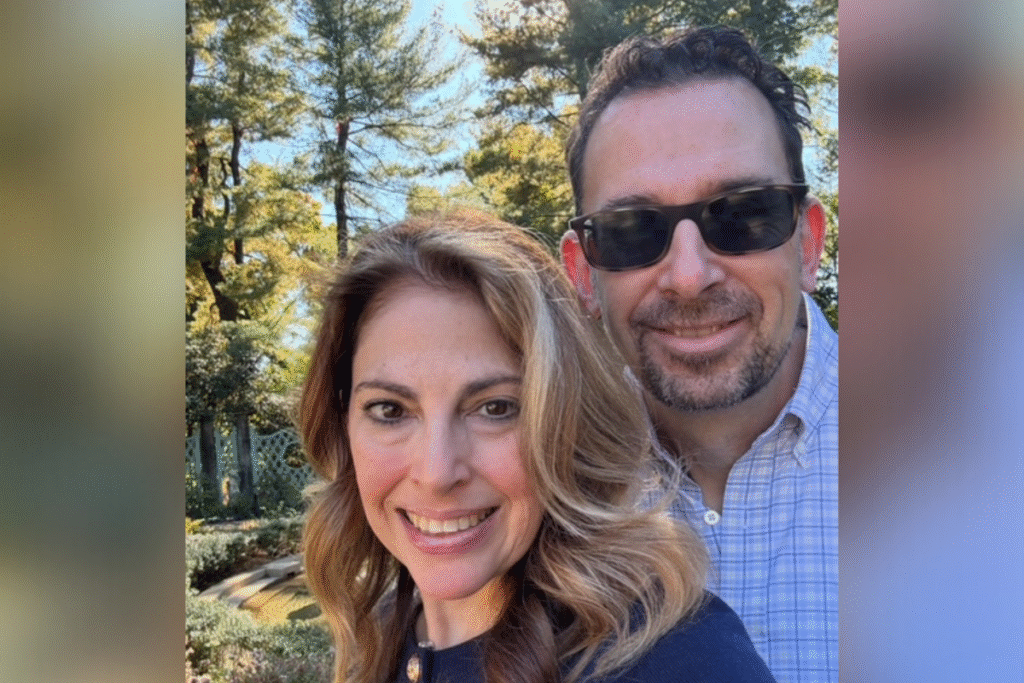I remember the moment everything changed. It started with something so small, a strange sensation in my armpit. My husband thought it was just a pulled muscle, and I was happy to believe him. It’s funny how we sometimes choose reassurance over reality.
When the conversation came up again at a family gathering, my sister-in-law, a breast surgeon, offered to take a quick look. Within seconds, her face changed. “Call your gynecologist first thing tomorrow,” she said. Her urgency was terrifying, but I decided to cling to the denial that it couldn’t be anything like breast cancer. After all, I had no family history! It had to be a cyst, right?
Wrong. I was sent for imaging at Atlantic Health’s Carol W. and Julius A. Rippel Breast Center in New Jersey, where results revealed a new reality and new identity for me. Suddenly, I wasn’t just me anymore. I was a cancer patient.
The first person to sit with me and explain the diagnosis was Renee, a nurse navigator. She told me, “It was caught early, and you will not be alone on this journey, as our team will be by your side. You’ll be OK.” In that moment, I tried to borrow her calm, but fear has a way of moving in quietly and unpacking fast.
Everyone around me seemed optimistic, running through what seemed to be a standard checklist to take me from cancer to carefree: 1) lumpectomy, 2) radiation, 3) Tamoxifen, a medication that prevents estrogen receptor-positive breast cancer by blocking estrogen’s effects. Yet, I couldn’t shake the undercurrent of worry. I tried to take things one day at a time, starting each morning with a quiet reminder: I am not my cancer diagnosis. I am more than that. Cancer is something you face, not something that defines you. I told myself, “You just have to stick to the plan and this will all be over.”
Then that plan went out the window.
Right after my lumpectomy, I learned that a small amount of cancer had appeared in one of my lymph nodes. This was the moment I created what I now call my “decision tree.” Suddenly, every option carried new weight. Would I agree to more testing? Would I try chemotherapy? I answered yes to both.
My oncologist created a personalized treatment plan and suggested we start with one round of chemo to see how I responded. The experience was brutal and took a major toll on my body. While I’m proud of having the courage to try chemotherapy, I’m equally grateful for the courage to ask questions, share my perspective, and make decisions about my care. My doctors supported me when I chose to stop chemo and worked with me to reframe my treatment plan. I’ve now been on Tamoxifen for six years, allowing me to move forward with confidence.
As a parenting coach, author, wife, and proud mom of two, I view my cancer journey through these lenses. Every challenge, from doubts and hard choices to fears and moments of courage, has shaped how I show up for my family and the families I guide. I see these experiences as chapters in my story, lessons to pass down.
Looking back, one of the chapters that caught me the most off guard was losing my hair. Every strand that fell felt symbolic, as if another piece of myself was slipping away, consumed by my new identity as a cancer patient. Hair seems insignificant until it’s gone; it is tied to confidence and identity in ways I didn’t always realize. To other women going through this, I want to say that it is OK—and even important—to grieve these changes. But don’t do it alone. Accepting comfort and companionship is not weakness; it is a strength to let your shield down and let someone in.
Support became my lifeline. My husband handled research when I couldn’t physically or mentally. I learned to ask my care team questions, and they gave me space for this. I learned to cash in on what I call my “cancer coupons,” permission to accept every bit of love or therapy someone offered.
Six years later, I still find myself hesitating to talk openly about being well. For a long time, I avoided pink ribbons and cancer walks because I didn’t want cancer to define me. But as a writer, I know stories hold power, and if sharing mine encourages even one person to get checked early or speak up when something feels off, then stepping out of my comfort zone is more than worth it.
I also share my story to remind other parents facing cancer or any life-changing diagnosis that they can still wear the badge of “parent” with honor. My children were 20 and 14 when I went through treatment. My older child, away at college, was somewhat shielded from the day-to-day realities, but my younger one saw it all. I tried to stay calm and carry on—because that’s what moms do—but I also hope that watching me take the time I needed to recover, both emotionally and physically, showed them the importance of giving themselves grace and space to heal when life feels overwhelming.
The “big C” has taught me many lessons. But if I had to boil it down to one, it would be this: Trust your instincts. If something feels off, don’t wait. Medicine has come so far, and early detection truly changes outcomes. Today, I trust my instincts more deeply, love more openly, and carry forward the lessons that remind me just how resilient humans are made to be.
Danielle Lindner is a parenting coach, educator, bestselling author, wife and proud mom of two.
Read the full article here

